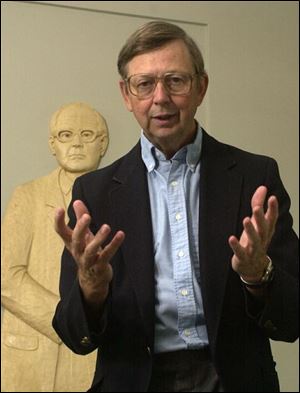
‘First Thursday' speaker to focus on U.S. response to terrorism
8/31/2002
The Rev. Jim Bacik, standing in front of a sculpture of his mentor, Karl Rahner, says the U.S. should seek justice, not war.
The Rev. Jim Bacik hopes to cover a lot of ground in his lecture Thursday on the war on terrorism. But he's also going to be realistic.
“I'm raising up a number of perspectives, but I only have 20 minutes,” Father Bacik said in an interview this week. “I'm going with ‘Plan A' at the moment, but it could be modified.”
The erudite pastor of Corpus Christi University Parish, who earned a PhD in philosophy from the University of Oxford, will open the Toledo Diocese's six-part lunchtime lecture series on Thursday.
The second annual First Thursday Dialogue Luncheon Series, held on the first Thursday of the month, focuses on “critical issues of our age.” Other upcoming lectures include the Toledo Diocese's response to sexual abuse and the impact of globalization on economic justice.
Few topics could be considered more critical to Americans today than U.S. efforts to capture and punish those responsible for the horrific attacks on New York City and Washington on Sept. 11.
“We're right on target here,” Father Bacik said of his subject matter. “What does this war on terrorism look like from the viewpoint of the Christian gospels?”
The professorial priest, who favors a jacket and tie rather than Roman collar, believes that President Bush has given the American public the wrong “dominant metaphor” in labeling the response as a war on terrorism.
“That is harmful. It fans the flames of hatred and revenge,” Father Bacik said. “It sets up an expectation of a final victory. And I think that in the long run it will not be the successful way of thinking about it.”
A more appropriate description, he said, would be to call it a quest for justice.
“What happened in New York was not an act of war, not an attack by a nation state against us. It was a criminal act by a small band of terrorists,” Father Bacik said. “Only nation states declare war. What they did was a horrendous, atrocious, barbaric, criminal act which killed so many people and brought so much suffering. But it's not an act of war, it's a criminal act.”
The American public expects to win wars, or at least to have a conclusion to a war, he said. But while the United States defeated the nation states of Nazi Germany and Imperialist Japan in World War II, it is not possible to defeat a concept such as terrorism.
“The danger of the war metaphor is that people get frustrated, then either lose interest or tend to discard the effort,” Father Bacik said. “We need a long, persevering, never-ending quest for justice.”
Some Christians question the pursuit of violence, he said, because Jesus preached in Matthew 26:52 that “all who draw the sword will die by the sword” and in Matthew 5:39, “If someone strikes you on the right cheek, turn to him the other also.”
But the Scriptures do call for justice, Father Bacik said.
“What you do get out of the biblical tradition is a great respect for persons and you get out of it this great quest for justice,” Father Bacik said. “Jesus keeps talking about and reaching out to the outcast. He reaches out to the margins and brings them into the mainstream. So justice is a key theme. The quest for justice is extremely biblical.”
A native of Toledo and a graduate of Central Catholic High School, Father Bacik, 65, received a master's degree from the Athenaeum of Ohio in 1960 and was ordained in 1962.
After earning a master's degree from Fordham University in 1969, Father Bacik studied at Oxford, the prestigious British university, receiving his doctorate in 1978. He has written seven books, the latest titled Catholic Spirituality: Its History and Challenge.
Corpus Christi Parish was founded in 1970 and its current modernistic church was built in 1998 on Dorr Street, across from the University of Toledo. Father Bacik helped raise $9 million for the construction of Corpus Christi and for establishing the chair of Catholic studies at UT, which was named in his honor.
He said America's quest for justice should include an effort to understand the “kinds of injustices that breed terrorism.”
“We have to understand better in the Christian West what moves and motivates the Muslim world,” Father Bacik said. He noted that Islam, which began in the 7th Century, was the world's dominant religion for centuries until the rise of Western civilization around the 17th Century.
“What you hear over and over out of the Muslim world is that they are humiliated by the West. ... They ask, ‘Why are we now in this inferior situation after being the dominant power for over 1,000 years?' That sets up their own inner debate and their own responses.”
Fueled by feelings of humiliation and injustice, and faced with the West's military superiority, some radical Muslims resort to terrorism, he said.
The priest has observed some positive results in how the nation has responded to Sept. 11. For one, Americans' “rampant individualism” has given way to a sense of unity.
He also has found an increased desire for spiritual answers following the attacks.
He cited Catholic theologian Bryan Hehir's writings about the “radical vulnerability” of people who live their lives under the constant threat of attack. That has been the situation for decades or centuries in Burundi, the Middle East, and Northern Ireland, but never before in the United States.
“In dealing with radical vulnerability, it's clear that you go to the religious traditions,” Father Bacik said. “The only way to deal with radical vulnerability is through faith in the great God. The attacks have raised that up.”